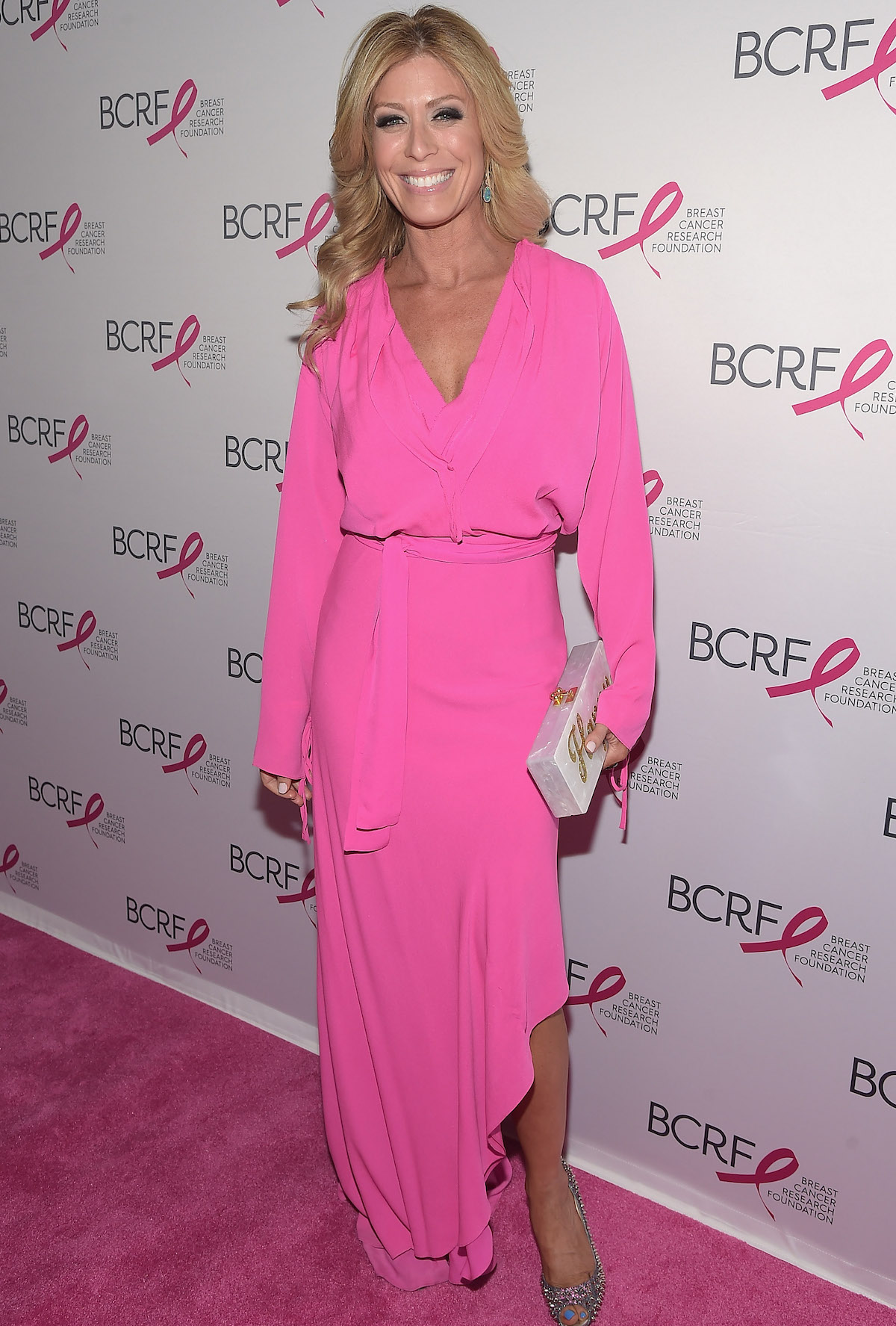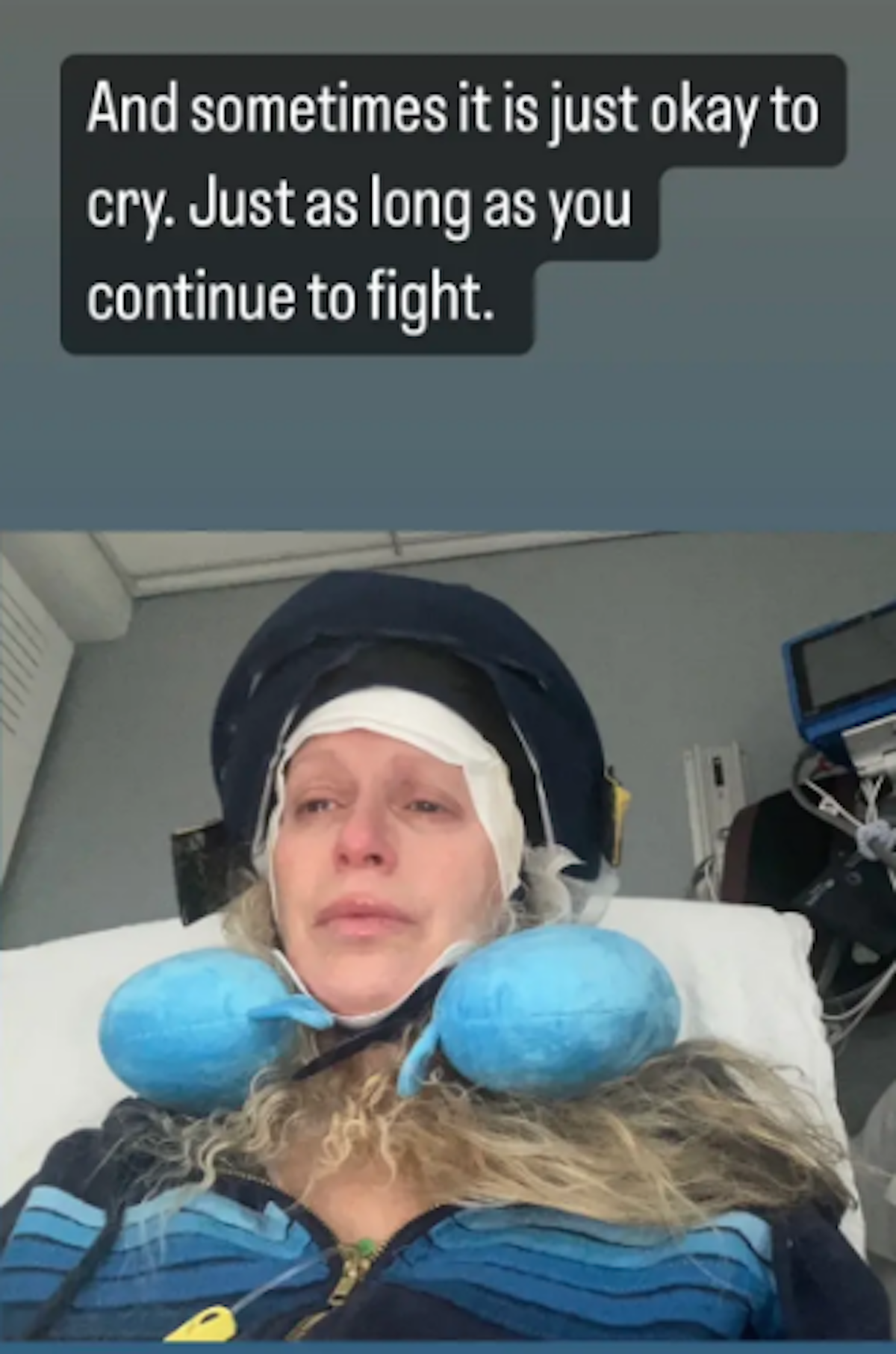Moments of Levity Soothes the Soul Amid Cancer
- ‘Today Show’ host Jill Martin Brooks, 47, is battling stage 2 breast cancer, and she’s navigating intense chemo, which comes with several side effects, including nausea, vomiting, and hair loss. Martin has found scalp cooling devices helping preserve her hair amid treatment.
- Food and Drug Administration (FDA) approved scalp cooling devices such as the one Brooks uses constrict the blood flow to the scalp; the caps limit the amount of circulating chemotherapy that reaches the hair follicles, protecting them from some of the chemo’s damaging effects.
- Genetic testing revealed Martin carries the BRCA gene mutation, which increases your chance of developing cancer, including breast and ovarian.
- Genetic testing can look for the BRCA genes BRCA1 and BRCA2. The National Cancer Institute estimates about 72% of women who inherit a BRCA1 mutation and about 69% of women who inherit a BRCA2 mutation will develop breast cancer by age 80.
- Actor Patrick Dempsey, 57, seen joking with Brooks by calling her “sexy,” is a play on his latest accolade. He was named the “Sexiest Man Alive.” However, he’s turned the added attention toward causes he’s passionate about, including cancer advocacy.
- The Dempsey Center was opened in 2008, and it supports patients and their families through complementary services like group therapy, support groups, educational classes, grief counseling, meditation, yoga, and acupuncture.
“Today Show” host Jill Martin Brooks, 47, and the “Sexiest Man Alive” Patrick Dempsey, 57, had a fun exchange ahead of a morning show appearance by calling each other sexy. Martin, who’s undergoing treatment for breast cancer, quips in an Instagram post, “Being called sexy while going through chemo is a drop.” Amid giggles, their exchange makes for a lovely pick-me-up for Martin, whose chemotherapy takes a toll on her physically and emotionally.
The exchange occurred as Martin was recording an Instagram story on her phone. Last week, Dempsey was named by People Magazine the “Sexiest Man Alive” to wide-range adoration. However, while basking in the spotlight because of the accolade, Dempsey has since used the added attention to help his causes, including supporting cancer patients.
Read More Afterward, Martin received a hydrating eye mask from their product line from Dempsey’s wife, Jillian. Martin shared a photo of the mask on Instagram, adding, “Now we can all feel sexy!” RELATED: Dempsey continues to support cancer patients and their families through the Dempsey Center.
Afterward, Martin received a hydrating eye mask from their product line from Dempsey’s wife, Jillian. Martin shared a photo of the mask on Instagram, adding, “Now we can all feel sexy!” RELATED: Dempsey continues to support cancer patients and their families through the Dempsey Center.Martin hinted towards her ongoing stage 2 breast cancer battle amid her light-hearted exchange with Dempsey. However, her journey is worth more than a passing comment, and people who are familiar with her situation know she’s undergoing intense chemotherapy, often called the “Red Devil.”
Martin has been transparent with her breast cancer journey, and the impact treatment has had on her. She said while the side effects of treatment are challenging, she’s at least grateful she’s been able to keep most of her hair. Hair loss is a common side effect of chemotherapy, but it is also one of the most difficult to endure. Luckily, like Brooks, who uses a cold cap for hair preservation amid treatment, options exist to help you through this challenging period.
WATCH: Coping with hair loss amid chemo.
The caps, which are tightly fitting and strap-on helmet-style, are filled with a gel coolant that’s chilled to between -15 to -40 degrees Fahrenheit.
Essentially, the caps “cause vasoconstriction, or a narrowing of the blood vessels bringing blood to the scalp,” Dr. Renata Urban, gynecologic oncologist at the University of Washington, explains.
By constricting the blood flow to the scalp, the caps limit the circulating chemotherapy that reaches the hair follicles, protecting them from some of the chemo’s damaging effects.
The cold also decreases the activity of the hair follicles, which slows down cell division and makes the follicles less affected by chemotherapy medicine.

“Cancer will take whatever you let it. It will take your soul, take your hair…cancer wants everything,” Martin said on an episode of “Today.”
Brooks enjoys her segments on the “Today” show showcasing steals and deals, but she knows the harsh journey awaiting her when she steps off-set.
“I leave the show, and I’m back to reality and fighting for my life,” she said amid tears about her tough cancer fight.
As the “Steals and Deals” guru said previously, she’s undergoing an aggressive form of chemo called “the red devil.” This form of chemo involves anthracyclines, an adjuvant chemotherapy treatment given after surgery. Research published in JACC: CardioOncology says anthracyclines offer a “10% improvement in disease-free survival and a 7% improvement in overall survival, compared with the initial standard regimen of cyclophosphamide, methotrexate, and 5-fluorouracil.”

Anthracycline and taxane (a class of chemotherapy drugs) have become a mainstay for breast cancer treatment. However, despite the effectiveness of these chemotherapy drugs, they come with intense side effects such as nausea, vomiting, and alopecia (hair loss), which helped give it its “red devil” nickname.
“Chemotherapy that we give currently is not the chemotherapy from days gone by,” says Dr. Matthew Carlson, a gynecologic oncologist at UT Southwestern Medical Center. Patients are not vomiting and stuck in bed for weeks on end or coming into the hospital.”
“I feel like a shell of myself. It’s not like the movie that you picture throwing up in the bathroom, at least for me. I sleep all day for five days,” Brooks said of her chemo.
Your doctor can offer you some remedies to help manage the side effects.
For nausea, doctors will usually prescribe effective medications, including Zofran, to help. “We have many, many, many medications that we give before, during, and after chemotherapy that should minimize the nausea that patients experience,” Dr. Carlson says, adding that there are also quite a few medications available for constipation and diarrhea. However, doctors may recommend dietary modifications first.
Helping Patients Cope with Chemotherapy
More on Jill’s Brave Cancer Journey
The brave and resilient journalist was diagnosed with stage 2 breast cancer last year. Her diagnosis came shortly after she underwent genetic testing and learned she carried the BRCA gene mutation, which increased her chance of developing cancer, including breast and ovarian.
After Brooks learned she carried the BRCA gene, she planned to get a preventative mastectomy to minimize her cancer risk. The procedure Brooks attempted to pursue is a prophylactic or preventive mastectomy, which removes breast tissue to prevent cancer from developing. This procedure is an option for women at higher risk, such as Brooks, who carried the BRCA gene mutation.

Brooks’ treatment involved a double mastectomy (removal of both breasts), and she had 17 lymph nodes removed. She said she still has more treatment ahead of her with a hysterectomy to reduce her ovarian cancer risk further.
Brooks is still journeying through aggressive chemotherapy.
How Patrick Dempsey Helps Give Cancer Patients Hope
“When my mother was diagnosed in 1998 with ovarian cancer, the feeling was absolute shock,” Patrick said. “This is the strongest person in my life. How can she possibly be vulnerable and sick, and what do I do? What can I do to help her?” Dempsey told SurvivorNet.
Inspired by his mom’s cancer diagnosis, Dempsey opened The Dempsey Center in 2008. The facility helps people affected by cancer by offering them support through complementary services like group therapy, support groups, educational classes, grief counseling, meditation, yoga, and acupuncture, among other offerings.
The Dempsey Center has locations in Portland and Lewiston, Maine. But people nationwide can also access their educational workshops, nutrition classes, movement and fitness classes, and integrative therapy workshops online here.
WATCH: Message of Hope from the “Sexiest Man Alive” Patrick Dempsey
The “Grey’s Anatomy” actor said his mom got to see the center before she died in 2014. He said she spent plenty of time at the center.
For nearly 16 years, he’s continued improving the relationship between cancer patients and their care.
Learn more about SurvivorNet's rigorous medical review process.

